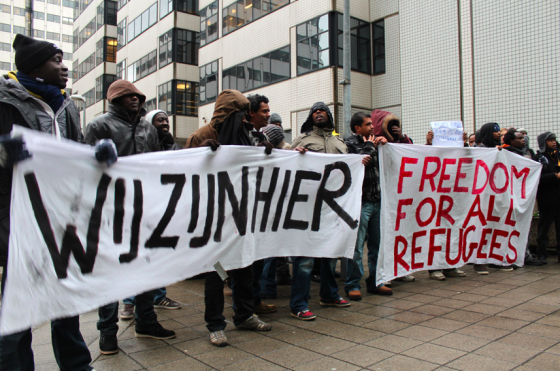The ‘us’ and ‘them’ divide in the Netherlands

 Former Labour politician and chairman of the Council for Public Administration Jacques Wallage feels that refugees shouldn’t be the victims of the ‘us’ and ‘them’ mentality fostered by politics.
Former Labour politician and chairman of the Council for Public Administration Jacques Wallage feels that refugees shouldn’t be the victims of the ‘us’ and ‘them’ mentality fostered by politics.
The range of popular reaction to the influx of refugees shows that the Netherlands is a divided society. After a Red Cross appeal, some 20,000 volunteers have come forward and their number is growing. Some local councils have little problem providing emergency accommodation while in others emotions are running high.
On closer scrutiny it is clear that the anger in places like Oudenbosch and Purmerend is about more than the arrival of the refugees. The angry citizen is filled with a mixture of resentment and long-felt frustration. The committed citizen is feeling relief at finally being able to act. For the angry citizen the sign ‘Welcome refugees’ is yet another indication of very unwelcome societal upheaval.
In short, where one citizen is reaching for his wallet, the other is reaching for the emergency break.
Grim divide
Behind the façade of the traditional political factions there’s the grim divide between commitment and anger, self-reliance and exclusion.
When PVV leader Geert Wilders talks about a ‘fake parliament’ he garners support across the board. The last Maurice de Hond poll showed that 44% of the VVD electorate agree with Wilders, and so does 30% of Labour voters.
Looking at the educational level, the divide is even clearer. 55% of low-skilled people agree with Wilders against 35% of people with a higher level of education.
The declining turnout at local and regional elections is yet another example of a divided country: people with a good level of education vote, an increasing number of lower skilled people don’t. According to public administration expert Mark Bovens, the Netherlands is turning into a ‘diploma democracy’: influence increases according to the level of education.
New reality
Slowly this new reality is challenging the tenets of politics and administration. Until recently it was a given that increased consumer confidence meant increased confidence in politics.
But recent figures from the government’s socio-cultural policy unit SCP tell another story: the economy is recuperating – slowly but surely – but confidence in politics (and big companies!) is declining. The feeling of being an outsider, that one’s opinion doesn’t count is generating anger. It doesn’t take much for irritation about high public and private sector salaries to blend with worries about healthcare and immigration.
Scandals such as the recent Volkswagen debacle further strengthen the feeling that power is manipulative and that citizens are at its mercy.
People who feel that they are outsiders in their own society won’t be open to an appeal to solidarity with the fate of refugees. The committed citizen feels part of society and is firmly in the ‘us’ camp. Angry citizens only see ‘them’, the people who determine their lives. That cultural divide holds true across the classic political board.
Consensus
It’s a divide which can only be bridged when a consensus is reached about the big problems of today, such as sustainability and migration, inequality and employment. But here politics, which should be a force for unity, turns out to be the weakest link in the chain. It is focused more on amassing power than on sharing it, more interested in holding forth than listening.
Refugees shouldn’t be the victims of this internal polarisation. Fortunately many people do care and try to help. But perhaps the anger of others should also be seen a sign of commitment: a cry that expresses the need to bridge the gap between institutions and people, between the vertical and the horizontal world.
Politicians shouldn’t leave that task to the populists.
This article was published earlier in the Financieele Dagblad
Thank you for donating to DutchNews.nl.
We could not provide the Dutch News service, and keep it free of charge, without the generous support of our readers. Your donations allow us to report on issues you tell us matter, and provide you with a summary of the most important Dutch news each day.
Make a donation